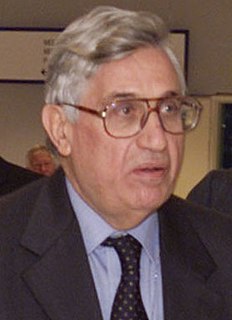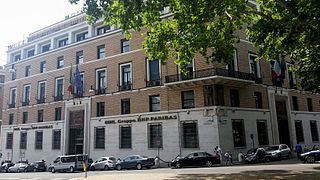Related Research Articles
Banco Ambrosiano was an Italian bank that collapsed in 1982. At the centre of the bank's failure was its chairman, Roberto Calvi, and his membership in the illegal former Masonic Lodge Propaganda Due. The Institute for the Works of Religion, commonly known as the Vatican Bank, was Banco Ambrosiano's main shareholder. The Vatican Bank was also accused of funnelling covert United States funds to the Polish trade union Solidarity and to the Contras through Banco Ambrosiano.

Antonio Fazio is an Italian banker, who was the Governor of Banca d'Italia from 1993 until his resignation amidst controversy at of 2005.

Banca Antonveneta S.p.A. was an Italian bank based in Padua, Italy. The bank was absorbed into Banca Monte dei Paschi di Siena in 2013.

Banca Nazionale del Lavoro S.p.A. (BNL) is an Italian bank headquartered in Rome. It is Italy's sixth largest bank and has been a subsidiary of BNP Paribas since 2006.

Unipol Gruppo S.p.A. is an Italian financial services holding company operating in the insurance and banking fields with headquarters in the Unipol Tower, Bologna. As of 2009 it was ranked as the country's fourth-largest insurer.
Maria Clementina Forleo is an Italian preliminary judge at the Court of Milan.
"Bancopoli" was the name coined by the Italian press for the finance and banking scandals between July 2005 and January 2006. The Italian Banca Popolare Italiana (BPI), in competition with Holland's ABN AMRO for control of Banca Antonveneta, was given an unfair advantage by Banca d'Italia's president, Antonio Fazio.

Banca Popolare di Vicenza (BPVi) was an Italian bank and currently a winding-down company. The banking group along was the 15th-largest retail and corporate bank of Italy by total assets at 31 December 2016, according to Mediobanca. However, its sister bank Veneto Banca also ranked 16th in the same ranking, making the whole banking group that under Atlante, had a higher pro-forma total assets than 10th of the same ranking, Crédit Agricole Italia. Due to its size, BPVi and Veneto Banca were both supervised by the European Central Bank directly, instead of the Bank of Italy.

Banca del Monte di Lucca S.p.A. is an Italian bank. It was related to charity organization Fondazione Banca del Monte di Lucca which they were split in 1990s.
Cassa di Risparmio di Lucca Pisa e Livorno S.p.A. was an Italian saving bank based in Lucca. It was a subsidiary of Banco Popolare and currently a sub-division and brand of the group Banco BPM.
Cassa di Risparmi di Livorno is a former Italian regional bank and charity organization, based in Livorno, Tuscany. In 1992 the organization was split into a limited company and a banking foundation Fondazione Cassa di Risparmi di Livorno.
Reti Bancarie S.p.A. was an intermediate holding company of Banca Popolare di Lodi Group. BPL's subsidiary reverse takeover listed company Banco di Chiavari e della Riviera Ligure in 2003. in 2006 it was absorbed into BPL.
Banca Popolare di Lodi was an Italian cooperative bank based in Lodi, Lombardy. The bank was absorbed into parent company Banco Popolare in 2011. However, the bank still operates as a division and a brand of the group.
Dexia Crediop S.p.A. is an Italian bank specializing in financing public infrastructure. It was part of Dexia Group, as the owner of 70% shares. Banco Popolare, Banca Popolare di Milano and Banca Popolare dell'Emilia Romagna owned 10% each as minority shareholders.
Nexi S.p.A. formerly known as Istituto Centrale delle Banche Popolari Italiane S.p.A. (ICBPI) is an Italian bank that specialises in payment systems such as Nexi Payments. The bank was specialised as a central institution of Italian Popular Bank..
Banca Agricola Popolare di Ragusa S.C.p.A. is an Italian cooperative bank based in Ragusa, Sicily.
Nuova Banca Mediterranea S.p.A. was an Italian bank based in Potenza, Basilicata. The bank was absorbed by Banca Popolare di Bari in 2004.
Banca Popolare Sant'Angelo S.C.p.A. is an Italian cooperative bank based in Licata and Palermo, the capital of Sicily. The bank also has one branch in Lampedusa, the south most island of Italy and also has a branch in Rome.
Banca Nuova S.p.A. was an Italian bank headquartered in Palermo, Sicily island. The bank served the island mostly, with branches in Calabria region; It was a subsidiary of Banca Popolare di Vicenza (BPVi), in turn owned by Atlante, a banking sector owned bail-out fund from 2016 to mid-2017. In June 2017 the bank was acquired by Intesa Sanpaolo by another government-funded bail-out, and a plan to absorb the bank was announced in October 2017.
Banca Rasini was an Italian bank in Milan, founded in the 1950s and acquired by Banca Popolare di Lodi in 1992. Its main claim to fame is the presence among its customers of Pippo Calò, Totò Riina, Bernardo Provenzano and Silvio Berlusconi. Silvio's father Luigi Berlusconi was an employee of the bank.
References
- ↑ "L'arresto di Fiorani Il Testo Integrale dell'Ordinanza del GIP (Arrest of Fiorani, the complete text)". La Repubblica. December 14, 2005.
- ↑ "La seconda vita di Fiorani: In tv darò consigli ai truffati (The second life of Fiorani: On TV I will give advice to victims". La Repubblica. July 14, 2007.